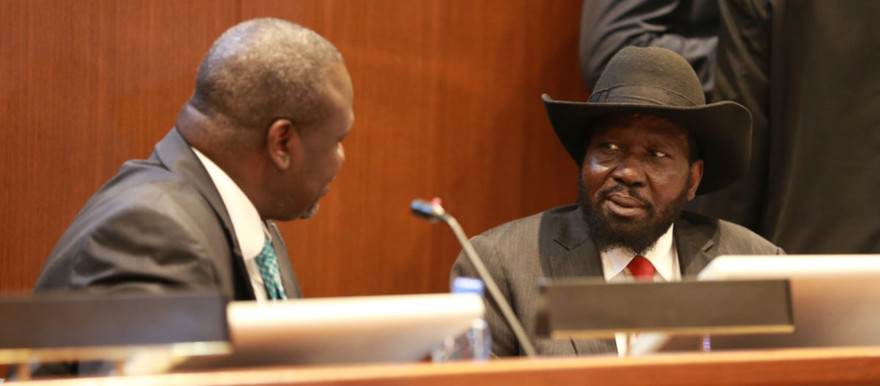It was an embrace that could end the suffering of 12 million people.
An historic coming together of two bitter foes who have spent five years fighting each other over ethnic differences and a tussle for power at the expense of the people of war-torn South Sudan.
The leader of the opposition armed forces, Riek Machar, has been in exile since civil war erupted in 2013. But today he came face-to-face with his chief military and political opponent, the President of South Sudan, Salva Kiir to make a fresh joint commitment to peace for the sake of their people.
Together on the stage of a conference hall in Addis Ababa, Ethiopia, they penned their signatures on a freshly-inked, revitalized peace agreement to end five years of devastating conflict.
The emotional moment was witnessed by those who have suffered most, like Mary Akech Bior, who shed tears as she watched the political enemies finally commit to end the war.
“I can hardly even express myself,” she said choking up with emotion as tears slid down her face. “If you go to the grassroots level, you will see how much people are suffering. The people in the refugee camps who are scattered all over the world are women with children running away for their own lives. And I can say, today should be the last day of the suffering of the people of South Sudan that at last they can gain peace.”
The signing of the revitalized peace agreement follows 15 months of patient negotiations led by the leaders of regional countries in the aftermath of a series of previously broken peace deals and ceasefires. The Government says it made significant concessions.
“When this process started, President Kiir stated that he was not going to take less than peace. He is looking for peace and he made the necessary compromises, even some of them were bitter, but it is necessary to bring peace to the people of South Sudan,” said a spokesperson for the President, Mayiik Ayii Deng.
The Opposition says that international support is vital if the new peace deal is to endure. While they look forward to the return of their leader, Riek Machar to the capital Juba at the end of an eight-month transition period, they say it will take time to heal old wounds.
“It will take time to end the suffering of the people of South Sudan and I don’t think three years will be enough to build the confidence between the warring parties,” said Sudan People’s Liberation Movement In-Opposition Spokesperson, Manawa Peter Gatkuoth.
It will also take time to reconcile the people of South Sudan given their suffering, he said.
“What happened in South Sudan is such a crime against humanity. What happened to the people of South Sudan is not good,” said Manawa Peter Gatkuoth. “It will take time but with the support of the international community, we hope that people will understand there is a need to bring people of South Sudan together, especially the leaders of South Sudan. They need to take the responsibility because they are the ones who took hard in this place and they are the ones who are supposed to change the situation.”
The international community stands ready to support the parties but says it must be persuaded that there is genuine collective political will to implement the agreement.
“We also know that the greatest challenges are yet to come during the implementation phase,” said the Special Representative of the Secretary-General and Head of the United Nations Mission in South Sudan, David Shearer. “The key ingredient still lacking is trust. The personalities signing the agreement have in the past been former friends and foes. From my discussions with all parties, suspicion is widespread. It is beholden on all of us here today to help encourage trust between parties.”
The SRSG said it would be a long and difficult process to reunify parties and people torn apart by war.
“These people have got animosities that go back two decades, three decades even,” he said. “Some of those will come out but overall they’ve got to put that behind them in the interests of 12 million people in South Sudan who really deserve a better future then they have at the moment.”
There remains concern about the level of political will that exists among the parties to fully commit to the peace deal given previous broken promises.
“In order to be convinced of the parties’ commitment, we need to see a significant change in their approach,” said United Kingdom Special Representative for South Sudan, Chris Trott. “This must include but not be limited to an end to violence and full humanitarian access, the release of political prisoners, and a real commitment to effective and accountable implementation demonstrated by supporting robust security mechanisms and enforcement mechanisms, checks on executive power and the transparent use of resources for the benefit of all South Sudanese.”
But the Government believes the agreement will endure because it has been driven by South Sudanese leaders with support from regional counterparts. It is determined to find the resources to implement the agreement.
“We believe that now we are going to scrape around. We are not going to rely on anyone else like before where we are waiting for someone to help us and nobody came,” said… And I hope also, you know, that people here in African come in with this condescending attitude so it’s made it difficult for them to listen to us when we say that there is a problem here, can you give us the time to solve this and that. They don’t normally listen to us but President Bashir, he understood it and like they are saying, African solutions for African problems.”
So, for the people of South Sudan, there is a glimmer of hope that the promise of peace and prosperity made on their historic day of independence seven years ago will finally be realized.




